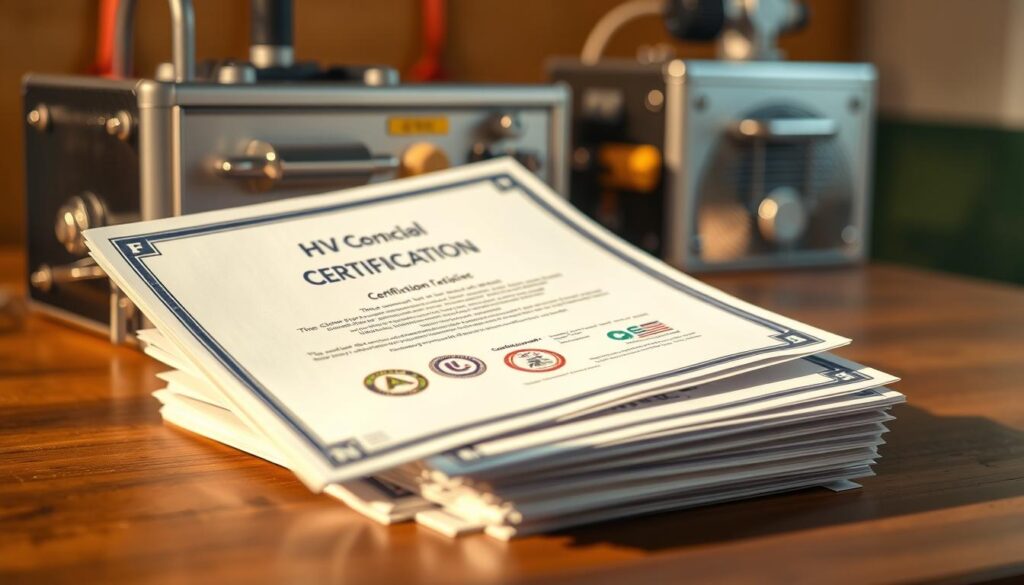Affiliate Disclosure
HVAC Guide Guys is a participant in the Amazon Services LLC Associates Program, an affiliate advertising program designed to provide a means for sites to earn advertising fees by advertising and linking to Amazon.
How Do HVAC Workers Make? Are you curious about how HVAC workers turn their technical skills into a good income? The HVAC field offers a promising path to financial success and career growth. It might be more than you think.

The HVAC technician job market is booming and full of opportunities. These skilled workers can make between $46,000 and $81,000 a year. Your salary can vary based on your experience, the type of work you do, and where you live.
Starting out, HVAC technicians can earn around $22.47 an hour. But, with more experience, they can make up to $32.83 an hour. This shows there are many chances for those looking for a stable and fulfilling job in HVAC.
Key Takeaways
- HVAC technician salaries range from $46,000 to $81,000 annually
- Entry-level technicians start at $22.47 per hour
- Experienced professionals can earn up to $32.83 per hour
- Career growth in the HVAC industry is significant
- Specialized certifications can increase your earnings
Table of Contents
Understanding the HVAC Industry Landscape
The HVAC industry is at the forefront of new technology and green solutions. Your career in this field is promising, with lots of growth and new chances in many areas.
Looking at the hvac job outlook, you’ll see a bright future. The Bureau of Labor Statistics says the HVAC sector will grow by about 23,000 jobs by 2032. This shows a big market expansion.
Current Industry Growth and Demand
The HVAC world is changing fast, thanks to several key factors:
- More people want energy-saving systems
- New tech is coming out fast
- There’s a big push for green solutions
- Smart homes and commercial tech are growing
Job Market Projections Through 2032
Experts say HVAC careers will see a lot of growth. The market’s growth rate is 6.1% from 2021 to 2026. This means good job security and lots of chances.
| Market Segment | 2022 Value | 2028 Projected Value |
|---|---|---|
| Global HVAC Market | $159 billion | $227 billion |
| Smart Thermostat Market | $1.2 billion | $3.8 billion |
| Indoor Air Quality Market | $9.8 billion | $11.9 billion |
Key Industry Trends
New trends are changing the HVAC world:
- Smart tech is becoming more common
- Standards for saving energy are getting higher
- Green and sustainable options are on the rise
- Advanced tools for checking and monitoring are coming
“The future of HVAC is not just about temperature control, but creating intelligent, sustainable environments.” – HVAC Industry Analyst
Your HVAC career is full of exciting chances. New tech and a focus on the environment are driving growth and demand like never before.
Explore Our HVAC Shop
Looking for top-rated HVAC tools, parts, and accessories? Visit our shop and find the perfect solution for your needs.
Visit the ShopHow Do HVAC Workers Make: Breaking Down the Numbers
Understanding how HVAC workers make their living shows a rewarding career path. The hvac technician salary landscape offers promising opportunities for skilled professionals across the United States.
Let’s dive into the financial details that shape an HVAC technician’s earnings:
- Average annual salary range: $40,000 to $70,000
- Entry-level positions typically start around $48,000 per year
- Experienced technicians can earn up to $79,000 annually
Comparing HVAC workers to related trades provides interesting insights. HVAC technicians earn comparably to plumbers ($26.52 per hour) and electricians ($27.01 per hour). This shows the competitive nature of this skilled profession.
| Experience Level | Average Annual Salary | Hourly Rate |
|---|---|---|
| Entry-Level (0-2 years) | $48,000 | $18 |
| Mid-Career (2-4 years) | $53,000 | $23 |
| Experienced (4-6 years) | $70,000 | $28 |
Your earning in HVAC depends on several key factors. Specialization is key – technicians focusing on commercial HVAC or advanced refrigeration systems can earn six-figure salaries.
“The most successful HVAC technicians continuously upgrade their skills and pursue specialized certifications” – Industry Expert
Additional earning opportunities include overtime pay, which averages around $7,000 annually. There are also bonuses for exceptional performance. By investing in professional development and targeting high-demand specializations, you can significantly boost your earning.
National Salary Averages and Ranges
Knowing the HVAC technician salary landscape is key to planning your career. The HVAC field offers good pay at different career levels. Pay varies with experience and specialization.
Entry-Level Salaries
Starting in HVAC, you can look forward to good pay. New HVAC techs earn about $52,300 a year, or $25.14 an hour. Your first pay can change based on where you work and your skills.
Mid-Career Earnings
As you gain more experience, your pay goes up. Mid-level HVAC techs make around $63,500 a year, or $29.00 an hour. Getting specialized skills and extra certifications can increase your earnings.
Senior-Level Compensation
Experienced HVAC pros earn a lot. Senior techs can make up to $74,500 a year, or $35.82 an hour. Those who supervise for seven years or more can earn $87,700 a year.
“Your career growth in HVAC directly impacts your earning” – Industry Expert
| Career Stage | Annual Salary | Hourly Rate |
|---|---|---|
| Entry-Level | $52,300 | $25.14 |
| Mid-Career | $63,500 | $29.00 |
| Senior-Level | $74,500 | $35.82 |
| Supervisory | $87,700 | $42.00 |
Your pay and benefits grow as you get better and build your network. Planning your career well can really boost your earnings in this fast-paced field.
Geographic Salary Variations Across States
Your HVAC technician salary can change a lot based on where you work. The United States has different pay levels in various areas.
Looking at HVAC technician salaries shows interesting facts about regional economies. States like California, New York, and Massachusetts pay more than southern states.
Top-Paying States for HVAC Professionals
- California: Average salary of $63,920
- New York: Average salary of $63,210
- Massachusetts: Competitive hourly rates around $52.93
Your work environment greatly affects your pay. Cities like San Francisco, New York City, and Boston offer the best pay for skilled technicians.
Salary Range Across Different Regions
| Region | Average Annual Salary |
|---|---|
| West Coast | $58,000 – $63,920 |
| Northeast | $55,000 – $63,210 |
| Midwest | $49,900 – $57,450 |
| Southern States | $45,000 – $49,280 |
“Location can be a game-changer in your HVAC technician salary trajectory.” – Industry Expert
Knowing about salary differences can help you plan your career. It might even make you think about moving for better pay.
Explore Our HVAC Shop
Looking for top-rated HVAC tools, parts, and accessories? Visit our shop and find the perfect solution for your needs.
Visit the ShopCareer Advancement and Earning Potential
The HVAC industry is full of chances for career growth and higher pay. Knowing how to climb the ladder can help you plan a successful career in this field.
Career Path Progression
Your journey in HVAC starts with entry-level positions and can lead to big salary increases. Technicians move through several stages:
- Entry-level technician (0-2 years)
- Intermediate technician (3-6 years)
- Senior technician (7-10 years)
- Specialized roles or management positions
Advancement Opportunities
The hvac job outlook is bright, with many career paths. You can move up to roles like:
- Service manager
- HVAC system designer
- Project supervisor
- Business owner
Salary Growth Timeline
Your pay goes up with experience. Here’s how salaries typically grow:
| Experience Level | Average Annual Salary | Hourly Rate |
|---|---|---|
| Entry-Level (0-2 years) | $50,590 | $22.47 |
| Mid-Level (3-6 years) | $60,000 | $28.85 |
| Senior-Level (7-10 years) | $70,000 | $32.83 |
Pro Tip: Keep learning and get special certifications to move up faster and earn more in HVAC.
“Your skills and dedication are the keys to unlocking higher salaries in the HVAC field.” – HVAC Career Experts
Essential Certifications and Qualifications

To increase your HVAC technician salary, getting the right certifications is key. These credentials show your skills and can raise your income in the HVAC field.
Important certifications help your career grow. The top ones include:
- EPA 608 Certification
- NATE (North American Technician Excellence)
- HVAC Excellence Certification
- Refrigeration Service Engineers Society (RSES) Certification
HVAC apprenticeships are great for getting these certifications. They offer 4,000 to 8,000 hours of supervised work experience. You learn by doing and in class.
“Certification is your passport to higher earning and professional credibility in the HVAC industry.”
The EPA 608 certification is very important. It has four levels:
| Certification Type | Specific Focus |
|---|---|
| Type I | Small appliances |
| Type II | High-pressure appliances |
| Type III | Low-pressure appliances |
| Universal | All equipment types |
Investing in your career with certifications can really boost your salary. Many employers want or need these certifications. This gives certified technicians a big edge in finding jobs.
Keep learning to stay ahead. Stay current with new tech and industry rules. This will help you earn more in the changing HVAC world.
Explore Our HVAC Shop
Looking for top-rated HVAC tools, parts, and accessories? Visit our shop and find the perfect solution for your needs.
Visit the ShopHVAC Specializations and Their Impact on Earnings
The HVAC industry has many specializations that affect how much workers earn. Knowing these areas can help you plan your career and increase your income.
Exploring different HVAC specializations shows unique career paths and financial gains. Each area has its own challenges and rewards.
Commercial HVAC Specialization
Commercial HVAC technicians work on big systems in buildings, universities, and hospitals. They earn more because of their advanced skills:
- Average annual earnings: $63,000
- Potential salary range: $56,843 – $71,827
- Advanced technical knowledge required
Residential HVAC Specialization
Residential technicians work on home systems. They earn less than commercial workers but have steady demand:
- Average annual earnings: $57,300
- Entry-level positions start around $37,000
- Consistent job opportunities in urban and rural areas
Industrial HVAC Specialization
Industrial HVAC experts work on complex systems in factories. Their skills are highly valued:
| Specialization | Salary Range | Key Skills |
|---|---|---|
| Refrigeration Technicians | $49,049 – $66,407 | Specialized equipment knowledge |
| HVAC Engineers | $70,214 – $82,169 | Advanced technical design |
By focusing on a specific HVAC area, you can boost your earnings and job stability in this fast-changing field.
“Specialization is the key to unlocking higher earnings in the HVAC field.” – Industry Expert
Benefits and Additional Compensation

HVAC technicians get a great package that’s more than just their salary. Knowing all the benefits shows how valuable this career is.
As an HVAC pro, you get many important things:
- Health Insurance: You get full medical coverage.
- Retirement Plans: A 401(k) with employer matching.
- Paid Time Off: You get vacation and sick leave.
- Performance Bonuses: Bonuses can be from $500 to $5,000 a year.
Specialized technicians get extra perks too. These can include:
- Tool allowances
- Company vehicle provisions
- Ongoing professional training
- Uniform and safety equipment stipends
“The right benefits package can significantly boost your total compensation and job satisfaction in the HVAC industry.” – HVAC Career Experts
Being in a union can also help. Union HVAC workers can earn up to 20% more. They get better contracts for more money and safety at work.
Getting certified and keeping your skills sharp can also pay off. Technicians with NATE certifications often make more and get better benefits.
Factors Influencing HVAC Technician Salaries
Understanding how HVAC workers make their income involves exploring multiple critical factors that shape their earning. The hvac job outlook shows that salaries are not fixed but change based on several key elements.
Experience is the main driver of salary growth. HVAC technicians see big wage increases as they move up in their careers:
- 1-4 years: Typically earn $40,000-$50,000 annually
- 5-9 years: Salary ranges between $50,000-$60,000
- 10-19 years: Can reach $60,000-$70,000
- 20+ years: Earnings of $70,000-$80,000 are possible
Where you work also affects your pay. Technicians in big cities or areas with high costs of living make 10-20% more than those in rural areas. Places like California and Texas offer salaries 15-30% higher than the national average.
“Specialized skills and certifications can significantly boost your earning in the HVAC industry.”
Certifications and specializations greatly impact how much HVAC workers earn. Important factors include:
- EPA 608 Certification
- Advanced technical training
- Specialized system expertise
- Commercial vs. residential experience
The hvac job outlook is strong, with a 13% growth expected from 2020 to 2030. Your ability to adapt, specialize, and keep improving your skills will greatly affect your earnings in this changing field.
Explore Our HVAC Shop
Looking for top-rated HVAC tools, parts, and accessories? Visit our shop and find the perfect solution for your needs.
Visit the ShopCareer Growth Strategies for Higher Earnings
The HVAC industry offers many ways to grow your career and earn more. By investing in your professional growth, you can find new opportunities. These opportunities can change your career path for the better.
Professional Development Strategies
To move up in the HVAC field, you need to keep learning and improving your skills. HVAC apprenticeships are a great way to start. They help you build your knowledge and open up more career doors.
- Pursue advanced technical certifications
- Attend industry workshops and conferences
- Stay updated on emerging HVAC technologies
- Network with experienced professionals
Skill Enhancement Opportunities
The demand for HVAC technicians is high, but those with special skills earn more. Learning skills from other technical fields can make you more valuable in the job market.
“Adaptability and continuous learning are the keys to success in the HVAC industry.” – Industry Expert
| Skill Area | Potential Impact |
|---|---|
| Smart Home Integration | Increased Earning |
| Energy Efficiency Solutions | Higher Demand |
| Advanced Diagnostic Technologies | Premium Rates |
Business Ownership Opportunities
For those who dream big, starting your own HVAC business can lead to unlimited earning. You’ll need strong management skills, a good client network, and a focus on unique services.
- Create a detailed business plan
- Get the right licenses and certifications
- Invest in marketing and customer service
- Focus on a specific service area
By using these strategies, you can take your HVAC career to new heights. You’ll have the chance to grow professionally and earn more.
Conclusion
The HVAC industry is full of exciting opportunities for growth and financial stability. You’ll find a job that pays well and offers job security. With a 15 percent job growth expected by 2026, HVAC technician salaries are competitive.
Starting your HVAC career can be very rewarding. You can begin with entry-level jobs and move up quickly with training and certifications. The highest salaries can reach up to $73,000, making it a great choice for those who want to learn and grow.
To make the most of your HVAC technician salary, plan your career well. Keep learning, get certifications, and work in different places like homes, businesses, and factories. The HVAC industry values your skills, adaptability, and problem-solving abilities.
Your success in HVAC depends on your love for technical work, eagerness to learn, and dedication. Whether you work in California, Texas, or elsewhere, your career can thrive. Seize the opportunities, keep improving your skills, and build a rewarding career in this dynamic field.

